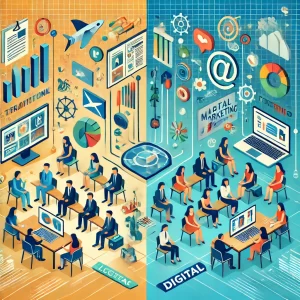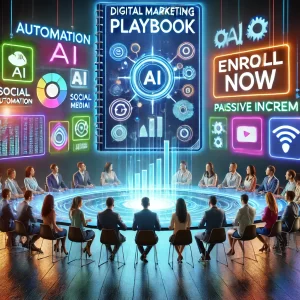The Role of Digital Marketing in the New Economy
Digital Marketing Strategies for the New Economy
The Role of Digital Marketing in the New Economy
Introduction
![]() As the global economy rapidly transforms due to advancements in technology and the ongoing clean disruption, digital marketing is emerging as a vital force that will shape the future of business. The shift from traditional marketing methods to innovative, data-driven digital strategies has given businesses and entrepreneurs unprecedented opportunities to thrive in the post-disruption world. Digital marketing is no longer just a supplementary tool; it is the foundation that will define success in the new economy.
As the global economy rapidly transforms due to advancements in technology and the ongoing clean disruption, digital marketing is emerging as a vital force that will shape the future of business. The shift from traditional marketing methods to innovative, data-driven digital strategies has given businesses and entrepreneurs unprecedented opportunities to thrive in the post-disruption world. Digital marketing is no longer just a supplementary tool; it is the foundation that will define success in the new economy.
In this blog, we will explore the pivotal role digital marketing plays in shaping the new economy. From the significant shift away from traditional marketing methods, especially in network marketing, to the integration of emerging technologies such as artificial intelligence (AI) and automation, digital marketing is at the forefront of this transformation. If you’re an entrepreneur or business owner, understanding these trends and how they’ll impact your business is crucial for staying competitive.
We’ve previously highlighted the power of digital marketing in our blog Success Stories in Digital Marketing, where we showcased how individuals have successfully transitioned to this new economy. Additionally, our post Why Personal Digital Marketing Businesses Are the Future dives deeper into the benefits of building a digital empire. Both blogs reinforce the importance of adopting digital marketing strategies in today’s fast-paced world.
As you read on, you’ll gain insights into the integration of new technologies with digital marketing and the opportunities that lie ahead for businesses and entrepreneurs who are ready to embrace the future.
The Shift from Traditional to Digital Marketing
The marketing landscape has undergone a seismic shift over the last two decades. Traditional forms of marketing, such as print advertising, direct mail, and face-to-face sales, are becoming less effective as consumer behavior continues to evolve. Customers now expect brands to meet them where they are—online.
This shift has been particularly evident in network marketing, a business model historically built on personal relationships, in-person meetings, and word-of-mouth referrals. For decades, successful network marketers relied on hosting events, cold calling, and face-to-face meetings to grow their businesses. However, with the rise of social media, content marketing, and online communication tools, network marketing has been transformed.
Key factors driving the shift to digital marketing in network marketing:
• Social Media Reach: Platforms like Facebook, Instagram, and LinkedIn have given network marketers access to a global audience, allowing them to engage with potential clients and recruits without the need for physical proximity.
• Content Creation: Blogs, videos, and webinars have replaced the need for hotel meetings and presentations. Digital content can reach far more people, while simultaneously building credibility and trust in the brand.
• Automation: Email marketing, chatbots, and digital funnels enable marketers to automate many aspects of the customer acquisition process, making it easier to scale their efforts.
This shift is not just limited to network marketing. Almost every industry has adopted digital strategies to engage with today’s consumers. For entrepreneurs, this means there are endless opportunities to connect with a global audience and build a brand that transcends geographic limitations.
Tools and Agencies Empowering Social Media Marketing
As social media continues to dominate the digital marketing landscape, the rise of tools and agencies designed to streamline and enhance the effectiveness of social media marketing has been a game-changer. Platforms like Tailwind, Buffer, Hootsuite, and various AI-powered marketing agencies have emerged as indispensable resources for businesses looking to grow their online presence, drive traffic, and increase conversions. These tools allow marketers to automate, analyze, and optimize their social media efforts with minimal manual intervention, making it easier to engage a broader audience while boosting efficiency.
 Key tools and services driving the success of digital marketing include:
Key tools and services driving the success of digital marketing include:
• Tailwind: Tailwind is a popular social media scheduling tool, specifically tailored for Pinterest and Instagram. It helps marketers and entrepreneurs schedule posts, track engagement, and receive recommendations for optimizing content. With Tailwind’s smart scheduling feature, you can post at the best times to maximize reach, ensuring that your content is seen by the right audience. The platform also provides detailed analytics, helping you refine your strategy based on real-time data.
• AI-Powered Social Media Tools: Many platforms, such as Lately and Jasper, leverage AI to automate content creation, suggesting copy and hashtags based on performance trends and engagement data. These tools analyze your audience’s behavior to recommend and automate posts that resonate, allowing you to maintain a consistent and compelling online presence.
• Social Media Marketing Agencies: In addition to self-service tools, many businesses turn to full-service social media marketing agencies that specialize in leveraging AI, automation, and data analytics to drive success. Agencies like Ignite Social Media and SociallyIn help businesses craft custom campaigns that expand audience reach, enhance brand visibility, and increase conversions. These agencies offer tailored services, from strategy development and ad creation to detailed performance tracking, freeing entrepreneurs from the intricacies of day-to-day social media management.
How Ad Bundles Boost Social Media Marketing
One particularly effective approach these platforms and agencies employ is the use of Ad Bundles. Ad Bundles are pre-packaged sets of social media ads that are designed to run across multiple platforms simultaneously, with variations tailored for each channel. They allow businesses to maximize their reach by targeting specific audience segments with personalized messaging, without the need for creating new ads from scratch for every platform.
Here’s how Ad Bundles can enhance your social media marketing efforts:
• Cross-Platform Integration: Ad Bundles allow you to launch a cohesive campaign across platforms like Facebook, Instagram, Pinterest, and LinkedIn with content tailored to the specific audience demographics of each platform. This ensures that your ads are consistently reaching the right people, whether they’re on social media or browsing the web.
• Data-Driven Targeting: By using AI-powered tools and analytics, Ad Bundles can be highly targeted, focusing on specific user behaviors, preferences, and interests. This increases the chances of engagement, driving more traffic and conversions from the audience most likely to take action.
• Optimized for Conversions: With each variation of the Ad Bundle fine-tuned to match the platform and audience, businesses can track and optimize the performance of each ad. For example, A/B testing features allow you to experiment with different headlines, calls-to-action, and visual elements to find the most effective combination.
• Streamlined Campaign Management: Ad Bundles save significant time by reducing the need to create multiple versions of ads for different platforms. Once the bundle is created, it can be deployed across channels with minimal additional effort, allowing marketers to focus on refining strategy rather than creating repetitive content.
Incorporating tools like Tailwind and utilizing Ad Bundles can help expand your social media reach, drive traffic, and convert audiences into loyal subscribers. These strategies ensure that your digital marketing efforts are optimized, efficient, and data-driven, allowing you to focus on scaling your business and delivering impactful results.
Integration of Digital Marketing with New Technologies
The role of digital marketing in the new economy extends beyond just adapting traditional marketing strategies for the digital world—it’s about integrating cutting-edge technologies to enhance marketing efforts and create more personalized, efficient customer experiences.
1. Artificial Intelligence (AI) and Machine Learning:
AI has revolutionized digital marketing by enabling businesses to automate tasks, optimize campaigns, and predict consumer behavior. AI-powered tools can analyze massive amounts of data to identify patterns and trends, allowing marketers to make data-driven decisions with greater precision. From chatbots providing customer service to AI-driven content creation tools, businesses can now offer personalized experiences at scale.
2. Automation:
Automation tools have become an integral part of digital marketing strategies. With platforms like ConvertKit, HubSpot and Mailchimp, businesses can automate email marketing, social media posting, and customer follow-ups, allowing them to nurture leads and close sales while focusing on other areas of growth. Automation not only saves time but also ensures that no potential customer falls through the cracks.
3. Augmented Reality (AR) and Virtual Reality (VR):
While still emerging, AR and VR offer exciting possibilities for digital marketers. From immersive product demos to virtual store experiences, these technologies allow businesses to engage customers in entirely new ways. As these technologies become more widespread, businesses that integrate AR and VR into their marketing strategies will stand out in the crowded digital landscape.
4. Data Analytics and Personalization:
In the new economy, data is king. Businesses that can effectively collect, analyze, and use data to personalize customer interactions will have a significant advantage. Tools like Google Analytics, customer relationship management (CRM) platforms, and AI-driven analytics systems allow businesses to create highly targeted marketing campaigns. Personalization is no longer a luxury—it’s a necessity.
As digital marketing continues to evolve alongside these technologies, the potential for businesses and entrepreneurs to grow and scale in the new economy is limitless.
Opportunities for Entrepreneurs and Businesses
 The ongoing digital revolution presents enormous opportunities for entrepreneurs and established businesses alike. The barriers to entry in digital marketing are lower than ever, allowing individuals to start and scale businesses without the need for large investments or complex infrastructures. This shift is democratizing entrepreneurship, offering a level playing field where anyone with the right knowledge and tools can succeed.
The ongoing digital revolution presents enormous opportunities for entrepreneurs and established businesses alike. The barriers to entry in digital marketing are lower than ever, allowing individuals to start and scale businesses without the need for large investments or complex infrastructures. This shift is democratizing entrepreneurship, offering a level playing field where anyone with the right knowledge and tools can succeed.
1. Lower Startup Costs:
Unlike traditional brick-and-mortar businesses, digital marketing businesses can be started with minimal upfront investment. A website, social media presence, and a clear strategy are often all that’s needed to get started. This low barrier to entry makes digital marketing an attractive option for entrepreneurs looking to start a business with little capital.
2. Scalability:
One of the most significant advantages of digital marketing is its scalability. Whether you’re starting with a small blog or a full-fledged e-commerce site, the ability to reach a global audience means there’s virtually no limit to how much you can grow. With the right strategies in place, digital marketing businesses can scale quickly and efficiently, without the traditional constraints of physical businesses.
3. Passive Income Streams:
Digital marketing offers numerous ways to generate passive income. From affiliate marketing and digital products to online courses and memberships, entrepreneurs can create multiple revenue streams that continue to grow even when they’re not actively working. This flexibility allows entrepreneurs to focus on other areas of their business or life while still earning income.
4. Flexibility and Independence:
For many, the appeal of digital marketing lies in the flexibility and independence it offers. Entrepreneurs can work from anywhere, set their own schedules, and focus on projects that align with their passions and interests. This level of freedom is rare in traditional employment and is one of the key drivers behind the growing popularity of digital entrepreneurship.
Call to Action: Enroll in Our Course to Understand the Future of Digital Marketing
 The future of marketing is digital, and the opportunities available in this space are vast. Whether you’re a seasoned entrepreneur or just starting your journey, digital marketing provides the tools and strategies needed to thrive in the new economy.
The future of marketing is digital, and the opportunities available in this space are vast. Whether you’re a seasoned entrepreneur or just starting your journey, digital marketing provides the tools and strategies needed to thrive in the new economy.
To truly succeed in this space, however, it’s essential to stay ahead of the curve and understand the latest trends, technologies, and strategies shaping the future of marketing.
That’s why we invite you to enroll in our course, Mastering the Art of Wealth Creation: A Journey Through Mind Power and Marketing. In this comprehensive course, you’ll learn how to:
• Build a strong online presence
• Leverage digital marketing tools and strategies
• Implement AI and automation to enhance your marketing efforts
• Develop scalable, passive income streams
• Thrive in the new, post-disruption economy
Click here to enroll now and take control of your future in the digital marketing world.
Also, make sure you are prepared for the coming disruption. Read the first blog post in the series, Introduction to Clean Disruption and its Implications, where we explore the constantly evolving world of technology.
#DigitalMarketing, #Entrepreneurship, #NewEconomy, #Automation, #AIMarketing, #WealthCreation, #DigitalEntrepreneur, #MarketingTrends, #PassiveIncome, #BusinessGrowth

John Rogers is a former Wall Street portfolio manager and served as CEO of Premium Enterprises and President of The Colorado Tire Recycling Center. He transitioned to digital marketing, founding WealthCreationMastermind.com to empower home-based entrepreneurs with cutting-edge strategies. Creator of the “Mastering the Art of Wealth Creation” online course, John has driven significant growth in network marketing, achieving the Blue Diamond rank and earning the title of Univera Associate of the Year in 2015. His expertise in leveraging technology for financial success transforms how entrepreneurs achieve their business goals.